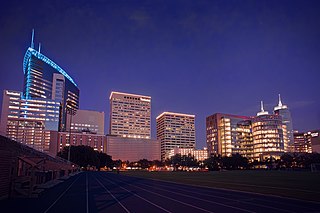
Houston is the most populous city in Texas and in the Southern United States. It is the fourth-most populous city in the United States after New York City, Los Angeles, and Chicago, and the sixth-most populous city in North America. With a population of 2,304,580 in 2020, Houston is located in Southeast Texas near Galveston Bay and the Gulf of Mexico, it is the seat and largest city of Harris County and the principal city of the Greater Houston metropolitan area, which is the fifth-most populous metropolitan statistical area in the United States and the second-most populous in Texas after Dallas–Fort Worth. Houston is the southeast anchor of the greater megaregion known as the Texas Triangle.

Texas is a state in the South Central region of the United States. At 268,596 square miles (695,660 km2), and with more than 30 million residents in 2023, it is the second-largest U.S. state by both area and population. Texas shares borders with the states of Louisiana to the east, Arkansas to the northeast, Oklahoma to the north, New Mexico to the west, and the Mexican states of Chihuahua, Coahuila, Nuevo León, and Tamaulipas to the south and southwest; and has a coastline with the Gulf of Mexico to the southeast.

The University of Houston (UH) is a public research university in Houston, Texas. Founded in 1927, UH is a member of the University of Houston System and the third-largest university in Texas with over 47,000 students. Its campus, which is primarily in southeast Houston, spans 894 acres (3.62 km2), with the inclusion of its Sugar Land and Katy sites. The university is classified as an "R1: Doctoral Universities – Very high research activity." UH is a Tier 1 school."There is no universally accepted standard for what overall "tier one" means, but in general, schools are expected to bring in at least $100 million per year in research grants, plus have selective admissions and high-quality faculty.""Four Texas Colleges Reach Carnegie "Tier One" Status"..
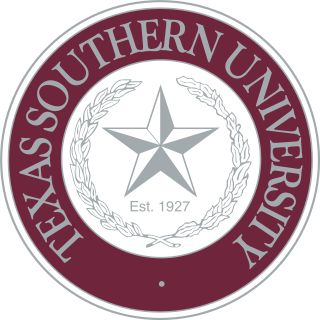
Texas Southern University is a public historically black university in Houston, Texas. The university is one of the largest and most comprehensive historically black college or universities in the United States with nearly 10,000 students enrolled and over 100 academic programs. The university is a member school of the Thurgood Marshall College Fund and it is accredited by the Southern Association of Colleges and Schools. It is classified among "R2: Doctoral Universities – High research activity".

The University of Houston Law Center is the law school of the University of Houston in Houston, Texas. Founded in 1947, the Law Center is one of 12 colleges of the University of Houston, a state university. It is accredited by the American Bar Association and is a member of the Association of American Law Schools. The law school's facilities are located on the university's 667-acre campus in southeast Houston.
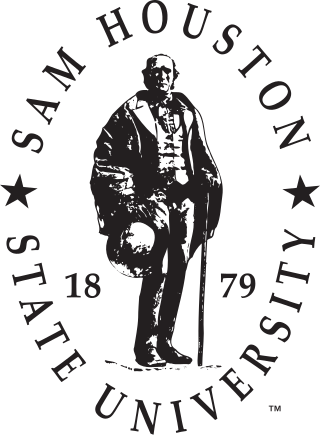
Sam Houston State University is a public research university in Huntsville, Texas. Founded in 1879, it is the third-oldest public college or university in Texas. It is one of the first normal schools west of the Mississippi River and the first in Texas. The school is named for Sam Houston, who made his home in the city and is buried there.

The reporter of decisions of the Supreme Court of the United States is the official charged with editing and publishing the opinions of the Supreme Court of the United States, both when announced and when they are published in permanent bound volumes of the United States Reports. The reporter is responsible for only the contents of the United States Reports issued by the Government Printing Office, first in preliminary prints and later in the final bound volumes. The reporter is not responsible for the editorial content of unofficial reports of the court's decisions, such as the privately published Supreme Court Reporter and Lawyers' Edition.

The University of Virginia School of Law is the law school of the University of Virginia, a public research university in Charlottesville, Virginia. It was founded in 1819 by Thomas Jefferson as part of his "academical village" – which became the University of Virginia – where law was one of the original disciplines taught. UVA Law is the fourth-oldest active law school in the United States and the second-oldest continuously operating law school. The law school offers the J.D., LL.M., and S.J.D. degrees in law and hosts visiting scholars, visiting researchers and a number of legal research centers.

South Texas College of Law Houston is a private law school in Houston, Texas. Founded in 1923, it is accredited by the American Bar Association. South Texas College of Law Houston is the oldest law school in the city of Houston. In 1923, the YMCA made the decision to establish a law school with a focus on offering night classes for working professionals.
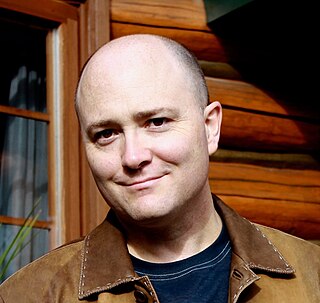
Norman Stephan Kinsella is an American intellectual property lawyer, author, and deontological anarcho-capitalist. His legal works have been published by Oxford University Press, Oceana Publications, Mises Institute, Quid Pro Books and others.

Saint Louis University School of Law, also known as SLU LAW, is a private American law school located in St. Louis, Missouri. It is one of the professional graduate schools of Saint Louis University. The University hosted a law school briefly from 1843 to 1847, making it the first law school to open west of the Mississippi River and first Catholic law school in the United States. The current law school was established in 1908 with its current name. The school has been ABA approved since 1924 and is a member of the Association of American Law Schools. Housed in Scott Hall, the law school has the highest enrollment of law students in Missouri. SLU Law has the highest bar passage rate in the state of Missouri. It offers both full- and part-time programs. The school is home to the University's Vincent C. Immel Law Library, one of the largest law libraries in the state of Missouri. Supreme Court Justice Clarence Thomas studied for his bar exam at the old Omer Poos Law Library on the main SLU campus.

The Tulane Maritime Law Journal is the preeminent student-edited law journal in the field of Admiralty and Maritime Law. Published semi-annually, each issue of the Journal includes scholarly works written by academics, practitioners, and students concerning current topics in Admiralty and Maritime Law. In addition, the Journal publishes an annual section on Recent Developments in Admiralty and Maritime Law for the United States and the international community, as well as periodic symposia on relevant topical areas in the field and quantum, collision, and forum selection clause surveys every other year.
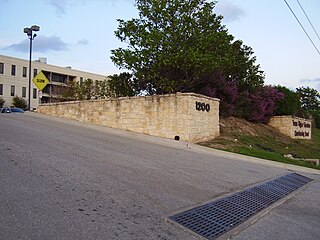
Texas has over 1,000 public school districts—all but one of the school districts in Texas are independent, separate from any form of municipal or county government. School districts may cross city and county boundaries. Independent school districts have the power to tax their residents and to assert eminent domain over privately owned property. The Texas Education Agency (TEA) oversees these districts, providing supplemental funding, but its jurisdiction is limited mostly to intervening in poorly performing districts.

Fordham University School of Law is the law school of Fordham University. The school is located in Manhattan in New York City, and is one of eight ABA-approved law schools in that city. In 2013, 91% of the law school's first-time test takers passed the bar exam, placing the law schools' graduates as fifth-best at passing the New York bar exam among New York's 15 law schools.
A law review or law journal is a scholarly journal or publication that focuses on legal issues. A law review is a type of legal periodical. Law reviews are a source of research, imbedded with analyzed and referenced legal topics; they also provide a scholarly analysis of emerging law concepts from various topics. Law reviews are generated in almost all law bodies/institutions worldwide. However, in recent years, some have claimed that the traditional influence of law reviews is declining.

Howard University School of Law is the law school of Howard University, a private, federally chartered historically black research university in Washington, D.C. It is one of the oldest law schools in the country and the oldest historically black law school in the United States.

The University of Haifa is a university located on Mount Carmel in Haifa, Israel. Founded in 1963, the University of Haifa received full academic accreditation in 1972, becoming Israel's sixth academic institution and the fourth university. The university has the largest university library in Israel. As of 2019, approximately 18,000 students were enrolled at the University of Haifa. Among Israeli higher education institutions the University of Haifa has the largest percentage (41%) of Arab-Israeli students.
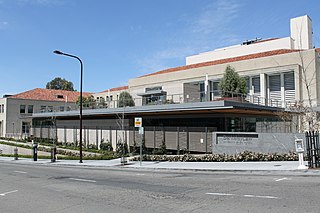
The University of California, Berkeley, School of Law is the law school of the University of California, Berkeley. It is one of 14 schools and colleges at the university. Berkeley Law is consistently ranked within the top 14 law schools in the United States.
David Nimmer is an American lawyer, law professor, renowned as an expert in United States copyright law. He received an A.B. with distinction and honors in 1977 from Stanford University and his J.D. in 1980 from Yale Law School, where he served as editor of the Yale Law Journal. David Nimmer is of counsel to Irell & Manella LLP in Los Angeles, California. He also serves as a Professor from Practice at University of California, Los Angeles Law School and Distinguished Scholar at the Berkeley Center for Law and Technology. In 2000, he was elected to the American Law Institute. He has served as a guest professor at the University of Haifa, Yeshiva University, the University of Miami, and Syracuse University.
The Houston Law Review is a law review published by the University of Houston Law Center. The journal is edited and published by students in one volume, divided into five issues, each academic year. The journal was founded in 1963.

















